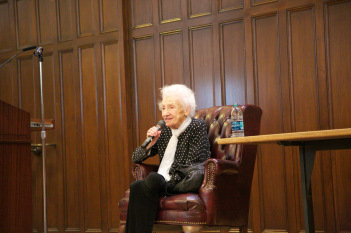History was remembered at Fordham University. Esther Bauer, a Holocaust survivor, told her story to a packed audience of students and faculty in the first floor auditorium of Keating on March 31st.
The Bias Incident Resource Group, Jewish Student Organization, United Student Government, Campus Activities Board, Commuting Student Association and Residence Hall Association organized the event.
Ms. Bauer began her talk on a light note. “My name is Esther Bauer. My maiden name was Jonas, like the Jonas Brothers, but we are not related,” she said.
Bauer described her early life in Germany. She was born in “the beautiful” Hamburg, Germany and she was born on March 13, 1924. “I’m 92 years young,” she said. Her father was the principal of the Jewish School in Hamburg and her mother was a medical doctor at the same school. Her mother also taught biology.
Bauer explained that her story is just one of many Holocaust experiences. “I can only tell you what happened to me personally. There are thousands of other stories, but I can only say for myself.”
Bauer described her childhood as being ordinary for a middle-class girl of her decade. Bauer also discussed the growing anti-Semitic sentiment and Hitler’s rise to power she experienced.
“Things became progressively worse. My father was very Orthodox. He would only eat kosher and one of the first new laws was no more kosher meat for Jews in Germany,” Bauer said. “One day, we couldn’t go swimming anymore, we couldn’t go to the opera anymore, not to concerts.”
Bauer explained that “No Jews Allowed” signs began appearing and she was then forced to wear a yellow star that said “Jew” in the middle. One day, her mother and her father were sent to the Theresienstadt ghetto. Each of them were only allowed to bring one suitcase.
“From one minute to the next when we went through the gate in Theresienstadt, we were prisoners,” Bauer said.
According to Bauer, the camps were in terrible conditions and her father died of meningitis soon after they arrived. After her father’s death, Bauer fell ill to double pneumonia and her mother had no medication.
At the camp, a friend of hers was given a notice that he would be sent to Dresden to build a new ghetto. Bauer and him were married so that when he left, Bauer was allowed to follow him but at the cost of leaving her mother behind.
However, Bauer was not sent to Dresden, but the Auschwitz concentration camp. “To tell you about Auschwitz in a few minutes is impossible. It was the worst of all camps,” Bauer said.
According to Bauer, people were killed in front of her and they were forced to endured freezing weather. She never saw her husband again and she was forced to work building planes for the war.
She spoke of how S.S. men and women would beat her and others. There was very little for them to eat.
However, one morning she and others prisoners woke up and the Nazis were gone. “The Americans came up the hill with the white flag and liberated us. That was, of course, the happiest day of my life,” she said.
Bauer revisiting the concentration camps that she was held, later in her life. She found that her mother was killed in the camps.
Bauer faced some struggles in her life after the concentration camp, including a lose of faith. However, she began a new life and married an American soldier. She now has several children and grandchildren.
Vice President of Student Life, Peter Vergara, FCRH ‘18, said the event was extremely moving. “To be able to tell the stories of such horror with a such a confident tone is remarkable,” Vergara said. “Her progress and resilience after the war is proof of the power of ‘mind over matter.’ Ms. Bauer was a humbling and fascinating speaker whose stories bring history alive, and who’s disposition serves as an ideal of fortitude.”
President of Fordham’s Jewish Student Organization, Marcella Leonard, FCRH ’18, discussed the importance of Ms. Bauer’s visit. “In remembering and discussing the atrocities of the Holocaust we are faced with the lowest point of humanity, a time characterized by hatred, intolerance, fear, and ignorance. Remembering forces us to recognize humankind’s capacity for the truly terrible,” Leonard said. “However, there is good to be found in remembering. Remembering gives meaning to the millions of lives that ended entirely too soon. Remembering reminds us that we must make a concerned effort to fight injustice, that we do have the choice and obligation to do so.”
Vergara mentioned a particularly powerful. “When someone asked ‘how did your experience change you?’ Ms. Bauer responded, ‘You don’t want to know… I’m atheist now.’ The room went quiet, for good reason.”
Leonard said that Ms. Bauer’s story is relevant today, especially in light of recent bias incidents. “For one, it reminds us that the swastika is a symbol of hatred, one the harms the entire community. It, along with Hitler jokes, anti-Semitism, and any form of intolerance have no place on our campus,” Leonard said. “I hope that we can work to continue to mitigate the effect that a few outsiders are able to have when they seek to harm the entire community with their actions.”





